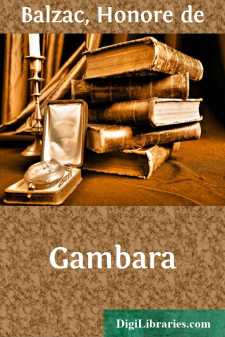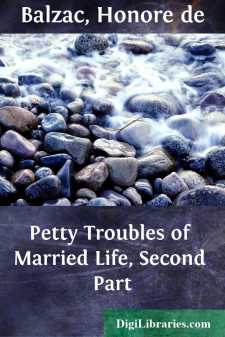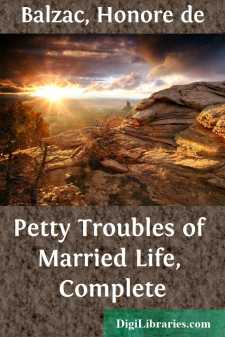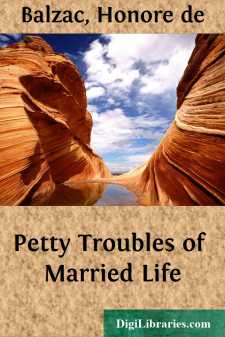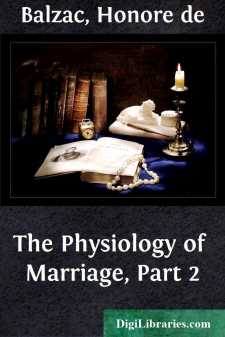Categories
- Antiques & Collectibles 13
- Architecture 36
- Art 48
- Bibles 22
- Biography & Autobiography 815
- Body, Mind & Spirit 144
- Business & Economics 28
- Children's Books 18
- Children's Fiction 14
- Computers 4
- Cooking 94
- Crafts & Hobbies 4
- Drama 346
- Education 58
- Family & Relationships 59
- Fiction 11833
- Games 19
- Gardening 17
- Health & Fitness 34
- History 1378
- House & Home 1
- Humor 147
- Juvenile Fiction 1873
- Juvenile Nonfiction 202
- Language Arts & Disciplines 89
- Law 16
- Literary Collections 686
- Literary Criticism 179
- Mathematics 13
- Medical 41
- Music 40
- Nature 179
- Non-Classifiable 1768
- Performing Arts 7
- Periodicals 1453
- Philosophy 65
- Photography 2
- Poetry 896
- Political Science 203
- Psychology 44
- Reference 154
- Religion 515
- Science 126
- Self-Help 85
- Social Science 82
- Sports & Recreation 34
- Study Aids 3
- Technology & Engineering 59
- Transportation 23
- Travel 463
- True Crime 29
Sort by:
by:
Honore de Balzac
GAMBARA New Year's Day of 1831 was pouring out its packets of sugared almonds, four o'clock was striking, there was a mob in the Palais-Royal, and the eating-houses were beginning to fill. At this moment a coupe drew up at the perron and a young man stepped out; a man of haughty appearance, and no doubt a foreigner; otherwise he would not have displayed the aristocratic chasseur who attended...
more...
by:
Honore de Balzac
MELMOTH RECONCILED There is a special variety of human nature obtained in the Social Kingdom by a process analogous to that of the gardener's craft in the Vegetable Kingdom, to wit, by the forcing-house—a species of hybrid which can be raised neither from seed nor from slips. This product is known as the Cashier, an anthropomorphous growth, watered by religious doctrine, trained up in fear of...
more...
by:
Honore de Balzac
If, reader, you have grasped the intent of this book,—and infinite honor is done you by the supposition: the profoundest author does not always comprehend, I may say never comprehends, the different meanings of his book, nor its bearing, nor the good nor the harm it may do—if, then, you have bestowed some attention upon these little scenes of married life, you have perhaps noticed their color—...
more...
by:
Honore de Balzac
STUDY OF A WOMAN The Marquise de Listomere is one of those young women who have been brought up in the spirit of the Restoration. She has principles, she fasts, takes the sacrament, and goes to balls and operas very elegantly dressed; her confessor permits her to combine the mundane with sanctity. Always in conformity with the Church and with the world, she presents a living image of the present day,...
more...
by:
Honore de Balzac
"Marriage is not an institution of nature. The family in the east is entirely different from the family in the west. Man is the servant of nature, and the institutions of society are grafts, not spontaneous growths of nature. Laws are made to suit manners, and manners vary. "Marriage must therefore undergo the gradual development towards perfection to which all human affairs submit." These...
more...
by:
Honore de Balzac
THE UNKINDEST CUT OF ALL. Is it a petty or a profound trouble? I knew not; it is profound for your sons-in-law or daughters-in-law, but exceedingly petty for you. "Petty! You must be joking; why, a child costs terribly dear!" exclaims a ten-times-too-happy husband, at the baptism of his eleventh, called the little last newcomer,—a phrase with which women beguile their families. "What...
more...
by:
Honore de Balzac
THE UNKINDEST CUT OF ALL. Is it a petty or a profound trouble? I knew not; it is profound for your sons-in-law or daughters-in-law, but exceedingly petty for you. "Petty! You must be joking; why, a child costs terribly dear!" exclaims a ten-times-too-happy husband, at the baptism of his eleventh, called the little last newcomer,—a phrase with which women beguile their families. "What...
more...
by:
Honore de Balzac
A TREATISE ON MARITAL POLICY. When a man reaches the position in which the first part of this book sets him, we suppose that the idea of his wife being possessed by another makes his heart beat, and rekindles his passion, either by an appeal to his amour propre, his egotism, or his self-interest, for unless he is still on his wife's side, he must be one of the lowest of men and deserves his fate....
more...


